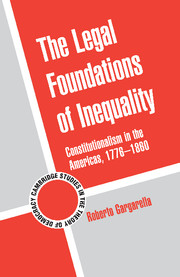1 - Radicalism: Honoring the General Will
Published online by Cambridge University Press: 06 July 2010
Summary
The Engine of American History
The existence or the possibility, real or imagined, of a government “by its citizens in mass” has been one of the most important causes of the development of American constitutionalism. Legal reforms were often adopted to prevent the radicalization of politics, that is, a situation where the rules simply enforced the norms preferred by the majority.
An illustration of this situation is the development of so-called radical constitutionalism in the United States soon after independence was declared. Following the revolutionary spirit of the time, many states enacted constitutions – the first “radical” constitutions – that came to empower a very active citizenry. These constitutions had a remarkable impact on the minds of the main political leaders of the country, who realized that such institutional systems adopted at the national level would subvert the already fragile order. Many of the fundamental features of the federal constitution may be explained by this historical fact: the early local constitutions taught the leaders what not to do at a national level. For example, the system of checks and balances, probably the main creation of the American Federalists, was a direct reaction to the system of “strict separation of powers” organized by the radical state constitutions. Thus, we may understand many of the defensive tools reserved to the different branches – the executive's powers of veto, the newly developed practice of judicial review, the ample legislative functions of the senate – as means that came to weaken the powerful legislatures created by those radical constitutions.
- Type
- Chapter
- Information
- The Legal Foundations of InequalityConstitutionalism in the Americas, 1776–1860, pp. 9 - 89Publisher: Cambridge University PressPrint publication year: 2010



